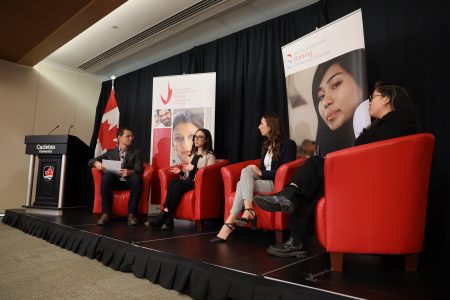Two Carleton PhD Students Win Coveted Vanier 2022 Awards
Today, Carleton University was the host site for the federal government’s announcement of the winners for the 2021-2022 Vanier Canada Graduate Scholarships and Banting Postdoctoral Fellowships.
Parliamentary Secretary Adam van Koeverden, on behalf of Minister François-Philippe Champagne and Minister Jean-Yves Duclos, recognized the more than 200 young researchers across Canada who have received these prestigious awards.
Carleton PhD students Alicia McVarnock (Developmental Psychology) and Chikezirim Nwoke (Anthropology) have both been awarded a Vanier Canada Graduate Scholarship valued at $50,000 per year for three years during a student’s doctoral studies. The coveted Vanier scholarships are awarded to Canadian PhD students who conduct exceptional research.

“All my congratulations to today’s recipients of the Vanier Canada Graduate Scholarships, and in particular, to the two Carleton students who are part of this select group. Alicia McVarnock and Chikezirim Nwoke embody the quality and positive impact of Carleton’s research and we can all take pride in their success,” says Carleton President Benoit-Antoine Bacon.
Graduate Studies Dean Patrice Smith concurs with these sentiments and adds that, “Recruiting exceptional graduate scholars to Carleton is a top priority and I am so pleased to see the Vanier program recognize the achievements of our exceptional students.
“Vanier recipients are leaders in innovation and exemplify a far-reaching commitment to sharing knowledge and shaping the future.”
Alicia McVarnock’s Research
McVarnock’s research examines shyness in young adults. Typically, shyness in this age group is linked to a range of social and emotional difficulties. But less is known about how shyness may be connected to academic adjustment in university.
McVarnock will be conducting two studies. The first will look at shy young adults’ course preferences and enrolment using a newly-developed questionnaire and interviews. The second will explore links over time between shyness, academic adjustment (i.e., academic achievement, communication, self-efficacy, intrinsic value, self-regulation, burnout, test anxiety and student satisfaction), well-being, academic communication, temperament-environment, goodness of fit and gender.

“It is hypothesized that shyness will predict academic difficulties and lower well-being over time through reduced academic communication with professors and peers,” says McVarnock. “It is also hypothesized that shy students will prefer lecture- and online-style courses as compared to seminars, and that links between shyness and poor academic outcomes may be magnified in seminar-style courses.”
Along with informing the academic and research community, her research will have implications for educational institutions to begin developing interventions targeted toward promoting academic success among shy young adults.
Chikezirim Nwoke’s Research
Nwoke’s research explores the concept of youth empowerment in the Onitsha market area of Nigeria.
Since the advent of the new millennium, the agenda of youth empowerment has been mainstreamed across government and international development circles but the resulting youth-focused policies and programs have not recorded much success in Africa.
“While studies on African youths exist, an in-depth ethnographic exploration of youth- lived experiences highlighting the intersection of global forces and Indigenous-knowledge systems is missing from scholarly literature,” says Nwoke.

Nwoke will be using participant observation and interviews that focus on Imu Ahia, a traditional youth-livelihood-mentorship system prevalent in markets in southeastern Nigeria, to understand how federal and local government policies, international trade agreements, and multi-level power contestations affect young traders who, in turn, reconfigure the terms of citizenship in society through their activities and involvements.
Nwoke hopes his research will be useful for Canadian international development aid programming directed towards youth and, comparatively, Indigenous youth-focused initiatives in Canada and elsewhere.
In 2021, Nwoke co-founded the Nigeria Youth Resistance Project, which is committed to documenting and critically-engaging acts of social-come-political resistance by young Nigerians at home and in the diaspora. Their debut output is an open access book entitled Ozugo focused on the 2020 EndSARS youth protests against police brutality in Nigeria. The book contains contributions from 16 young Nigerian scholars, poets, photographers and activists.
Nwoke points out that his passion for studying youth stems from his more than 10 years of experience working with international development organizations that focus on economic and sociopolitical issues and outcomes with regards to youth across Nigeria, Cameroon, South Sudan and Uganda.
Vanier Canada Graduate Scholarships
Named after Major-General Georges P. Vanier, the first francophone Governor General of Canada, the Vanier Canada Graduate Scholarship program helps Canadian institutions attract highly-qualified doctoral students.